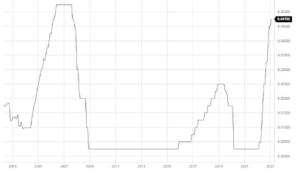Interest Rates Are On The Rise

Graph of Bond Yield Restriction
Addressing yield restriction in your jurisdiction is an important step toward staying compliant and avoiding unexpected rebate obligations. You’ve probably heard about rising interest rates in this country. Unless you’ve been on a year-long sabbatical in the Amazon. If so, welcome back. Early in 2022, the Federal Reserve, through its Federal Open Markets Committee (FOMC), began raising its federal funds target rate from near-zero levels. The federal funds target rate guides overnight lending among U.S. Banks and establishes a direction for domestic monetary policy. The rate hikes started slowly in March 2022 and then rose more aggressively starting in June. The rate hikes have already begun to shake up the stock & bond markets, with many Americans seeing red. The federal funds target rate is expected to climb further in the months to come as the FOMC continues its fight against inflation.
Investment Rates Are On the Rise
Financial institutions across the nation are expected to follow the Federal Reserve in raising rates. This means that money markets, certificates of deposit (CDs), and most other securities could be offered at rates greater than 4%. If your jurisdiction has issued a series of bonds in recent years, it may be time to take notice. It’s important to note that rebate cannot cure a yield restriction problem. A positive yield restriction liability is still possible, even if your bonds are earning negative arbitrage.
How Does This Affect Your Tax-Exempt Bond Issue?
Tax-exempt bonds have had a historically low borrowing rate over the last ten years. With the sharp rise of investment returns on investments purchased with bond proceeds, your bonds have likely accrued a liability that may be due soon.
Construction bonds, refunding bonds, and debt service funds securing an issue with bond proceeds are all candidates for violations of yield restriction rules. Construction bonds issued in 2018 with 5th year filings due in 2023 are at risk, especially if any projects encountered significant delays during the COVID-19 pandemic. Refunding bonds, which are often issued to achieve cost savings for their jurisdictions, are not immune to yield restriction rules. Unspent proceeds of the refunded bonds are subject to yield restriction rules and, depending on the nature of the refunding, may be accruing a liability to the IRS from the date of issuance.
Debt service funds with a nexus to a bond issue can also drive up your liability. Maintaining a “bona fide” debt service fund, defined in Regulation 1.148-1(b) as a fund primarily used to pay principal and interest annually, is one of the best ways to protect against incurring an arbitrage rebate and yield restriction liability.
Yield Restriction And The Materially Higher Yield

It’s important to remember that yield restriction rules are separate from arbitrage rebate rules. For yield restriction purposes, earnings are permitted above the bond yield up to, but not exceeding, a “materially higher” yield. This materially higher yield can vary depending on the characterization of the proceeds. For example, project proceeds invested past the end of their temporary period (usually 3 years), are allowed to be invested at the bond yield + 0.125%. Any investment earning at a rate higher than the” materially higher” yield will incur a liability to the IRS. Noncompliance with these yield restriction rules can be corrected with a yield reduction payment.
Monitoring Your Bonds
By monitoring arbitrage compliance early and often, ACS can employ accounting methods to help significantly reduce the positive arbitrage liabilities accruing on your outstanding bond issues. With earnings rates over 4% in even the simplest of money markets, ACS is highly recommending that issuers of tax-exempt debt complete an arbitrage rebate report annually. Completing annual reports has the advantage of allowing your jurisdiction to encumber and mitigate liabilities in their records before a payment is due.
Find out more about yield restriction here:
Phase 1 Tax Exempt Bonds (TEB)
Lesson 2 Advanced Topics in Arbitrage
TEB Phase 3 (Refundings)
Or just let ACS handle it! Contact us today for a free consultation on your outstanding bond issues.

